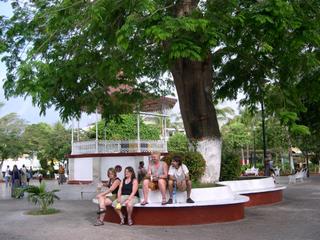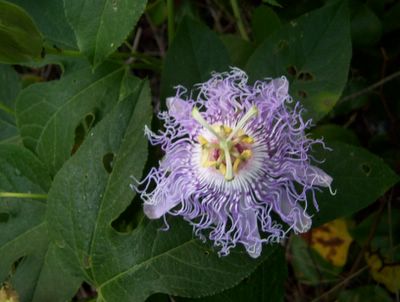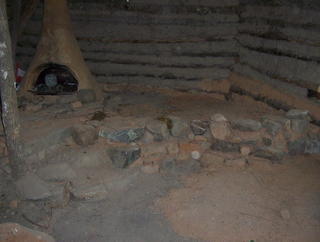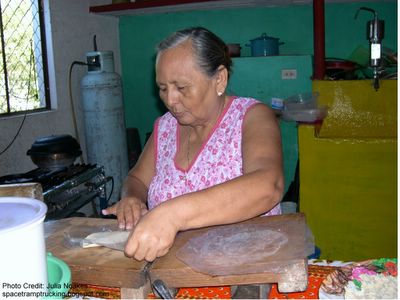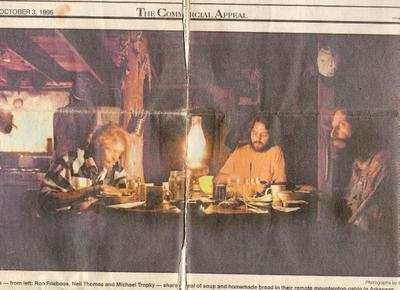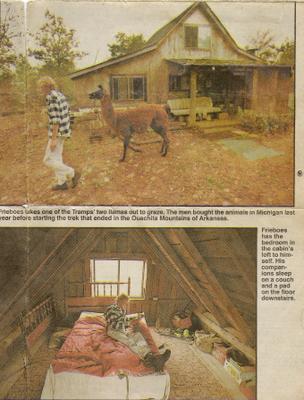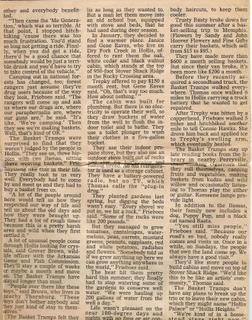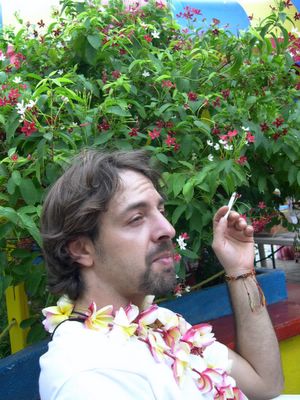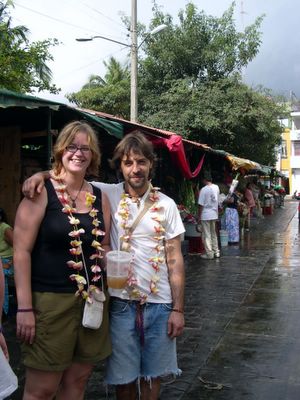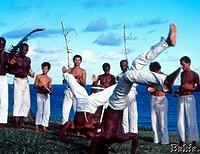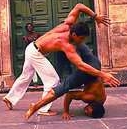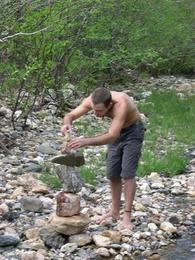
In March, two gay Arkansas couples ran away from home to get a taste of the
third-world. Ok, maybe Mexico isn't all that
third world, but it certainly isn't Vienna. Most people wouldn't like the type of travel we do: no reservations, lowest-budget, get wasted at the beach, lose the map...but then again, we're not most people. Meet the
Band of the Hand!Kelly plays the guitar and sings. She pokes holes in people if the pay her. Sonya is an excellent cook and fixes people's hair. Alan is my sweetheart. He loves plants and animals...especially tropical stuff. He is a CNA, like me. What about the thumb, you ask? Well, we didn't meet her for a week into the trip, but, ok--a preview. Meet Julia Elfkin, who hails from the otherside of the rainbow. This fellow traveler extraordinaire had been wandering the world for seven months when Kelly found her mumbling to herself on a bus.





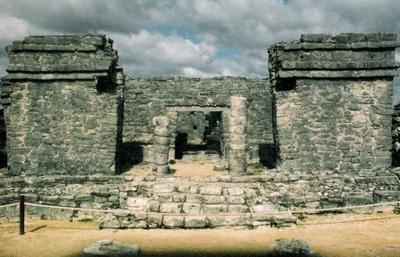
Tulum was the Mayan City of Venus

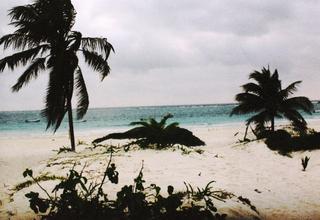
We first flew to Cancun, but immediately got on a bus and headed south to Tulum. This is the beach we stayed at. It is called Sante Fe. It is the nearest cabaña/campground to the ruins. If the old coral farther along the beach weren't so shap and dangerous, we could have walked to the ruins. Kelly and I went walking on it, but it chewed persistantly on our flip-flop soles.

We saw a ghost crab, though, and got to see the naval base. The ruins in Tulum were in a spectacular location--on a short limestone clif overlooking the Caribe and the world's second largest coral reef spanning most of the east coast of the Yucután penninsula. It would have been nice to spend more time in Tulum, but we were on somewhat of a schedule. Our return flights left from Mexico city,
on different days, and only six or seven hundred miles away. We took the scenic route...
2,300 miles or more and a $30 shoeshine later, we arrived at the Mexico City airport.


This iguana better watch out! Someone might catch him and cook him. Yes, iguana is a regional delicacy. Alan and I ate an iguana tamale. It tasted good, but I got grossed out on the third bite when I pulled out a whole leg, with
BONE AND SKIN still intact. But that's what happens when you eat out--you're at the mercy of the comedora. Better to prepare you own iguana. Everyone knows someone who has a pet iguana they don't want anymore. People are giving them away left and right. Next time someone offers you one, take it. Just don't tell 'em you intend to cook it, or he might change his mind. (Same goes for guinea pigs, by the way. If you email me privately, I'll send you a recipe that would win the heart of the Peruvian ambassador.)
Here's a recipe to get you started:
Delicious Tree Chicken!Iguana Stew for 20
1 med.-lrg. Iguana
1 lrg. yellow onion, chopped
2 cloves garlic, crushed
4 tomatoes, quartered
2 Habanero peppers, stems removed and chopped
4 tsp. Achiote Oil
4 Tbls. ground chile powder
black pepper
salt
water
Make the achiote oil by frying the achiote slowly until the oil is red.
Kill the iguana by
cutting off its head.
Open the belly lengthwise and
remove all the entrails and the rectum.
Cook in salted water until the meat is tender (take care not to let it
get too soft).
Peel and cut in portions.
Season with all the above ingredients and cook with about 1 cup water,
until almost dry.
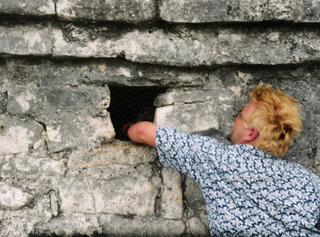
Alan yells, "I got it! Quick! Get the seasoning salt!"
We went south from Tulum, to Chetumál. On the bus we met a tour guide named Jesús, who
tried to gave us directions to meet him and his
embarazado girlfriend for tacos, but we never found the place. Perhaps she was too "embarrassed." He did, however, recommend a nice hotel, Hotel Ucum, tele: (01)(52)832-07-11, or 832-61-86. Their rooms are about $20 a night, immaculately cleaned tile floors and baños, and quite spacious. At this point in the trip, we hadn´t learned how to say, "one bed," or "one bed for two people." Heck. I don't think we learned the word for bed until Puerto Ángel, a week later. Our room at Hotel Ucum had
four queen-sized beds. We didn't even know how to argue, so we just used the extra space to spread out our packs, and try to do some laundry (it never dried). Hotel Ucum is just a few blocks from Museo De La Cultura Maya, and is right across the street from
Poza Rica, an herbal pharmacy. Sonya got some magic sunburn relief cream there, and a really neat calander. Did you know that every day has a special patron Catholic saint? They have a lot of holidays, and are eager to celebrate all of them.
Chetumál is a Mexican border town. It borders with Belize, so it has a sizeable English-speaking population. I saw a lot of Mennonites, probably from Belize, shopping in Chetumál. Perhaps the prices in Mexico are lower than Belize. i don't know. maybe they were on vacation. Again, it would have been nice to spend more time in Chetumál, but there was no beach there (that we found), and with the time frame hanging over our heads, we only spent one night. Kelly thought about writting 'passport' with a black magic marker across her chest, to see if the Belizian authorities would let us enter without proper travel papers, but she decided not to risk it. Maybe next time.


While in Chetumál, we visited our first real market. we had lunch at a place built out of old crates and pallets, and a baby screamed in our ears the whole time. Somehow, it moved me to tears. Kelly and I had our first glass of yummy mexican orange juice. Later at a café near the bus station, we learned how to say, ¡Qué sabrosa! We also went to the zoo located just north of the bus station and military compound. It was free, and they had some very interesting animals...well, I guess they're the same animals you'd see at any zoo. But did I mention it was
FREE?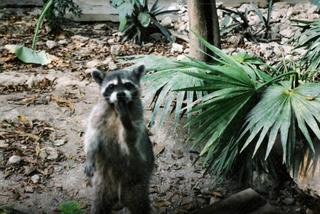
We boarded the bus out of Chetumál right after sunset. According to what we had read, there were no places to stay between Chetumál and Palenque. We were quite disappointed when we got to Escárcega for la cena, and saw all the hotels. Maybe it wasn't in the book because there were no
destinations there, or maybe it was an
unfriendly area. At any rate, we had bought the tickets all the way to Palenque, and we were too cheap to forefiet our fares, get a nights sleep, and pay again in the morning. So back on the bus we went, all fattenned on tacos. Alan and I were assigned seats a few rows back from the girls. That's when they met Julia. Anyway, the ride got bumpier and bumpier, people were shooting us hateful glares for smoking on the bus, but we were so tired and road weary, we didn't care. Finally, we arrived in Palenque at about 5 am. As I was about to get a cup of
café loco from a street vendor--or was it
café local--Julia piped in, "There's a sign on the wall that reads:
No acepte cualquier cosa comer o beber de extranjeros que pueden intentarle a la droga y robar sus artículos." So I decided not drink the coffee. We all piled into a cab and went found a hotel called Posada Bonampak tele: 345-09-25. Very cheap,about $10 a night. It was right up the hill from the most delightful restaurant, where we had chicken mole, boiled jicamas and delicious café de Chiapas.
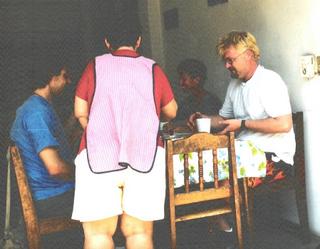


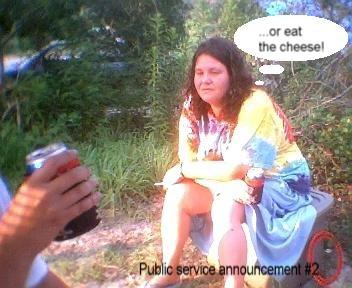
If I had to choose one one place to return to in Mexico, it would have to be Palenque. The Lonely Planet Mexico book calls the town a, "sweaty humid place with little attraction except as a base for visiting the ruins." I guess everyone is entitled to their opinion, but I think palenque was fantastic! Small, grubby, crowded, jungle! palenque aslo serves as a base to Misol Ha, whnich is where scenes from the movie Predator were filmed. The mountains were so steep, but every inch of what could be tilled was planted in corn. I guess if it's a matter of cutting down the rainforest or feeding your family, I'd start cutting. Can you blame them? You can't eat wood. The people in Palenque need yor tourist dollars.
Here are some pictures of Stuff around Palenque and Misol Ha.

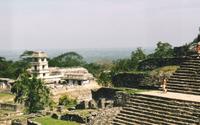


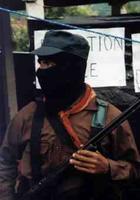
We left Palenque at reasonable hour and headed for San Cristóbal de las Casas. We decided to take dramimine for this ride, since we were so high up AND going even higher. We boarded a mini van that held about twelve people, and zipped up over the mountain at a speed that no one but the driver was comfortable with. On the way, the bus stopped in small towns to get snacks and pick up more people. In several towns we saw guys that looked like this and knew we were in Zapatista land. If you are interested in learning about the Zapatista movement, go to:
http://www.ezln.org/documentos/2005/sexta1.en.htm or this link:
http://flag.blackened.net/revolt/mexico/begindx.html I think they just want indigenas to be treated fairly, and be represented fairly by their government, but I'm sure the problems are much deeper than I am aware. I have heard from some people that the Zapatistas were 'riled up' by American University educated
revolutionaries akin to maoists. Who knows. I wouldn't say I felt any less safe around the Zapatistas, but I did feel a presence of unrest and discontention the wasn't as palpable elsewhere. San Cristóbal is a very chilly city. It is so high up, that it is important to remember a sweater for the evenings. We stayed at a great hostal called Hotel Plaza Central, tele: 674-51-25. It was located only about three blocks from the zócalo. Hotel Plaza Central's rooms were between $5 and $20 a night. They were large enough, but with no fan. You really don't need a fan though, like I said, it's rather chilly.
Our first night in San Cristóbal de las Casas, Sonya and Kelly decided to stay in for the evening. Alan and I went out with Julia and Josh from Ann Arbor (of
all the places one could bump into someone from Ann Arbor, Michigan, it
would be at a hostal in San Cristóbal de las Casas), to a pizza joint a few blocks away. It wasn't that good, but Josh was cute, and we were thinking he and Julia would hook up. Julia made it quite clear that she sat on the same side of the sexual persuasion fence as the rest of the
Band of the Hand. While eating pizza, a car load of zpatistas drove by, waving a black flag and shouting something. I asked the waiter (who was an unusualy
white Mexican) what all the commotion was about, but he just shrugged his shoulders. Hmm.
The next morning we went to the zócalo for el desayuno. Have I mentioned that the coffee in Chiapas is superb? It is freshly ground and brewed, rather than the usual instant fare, and they keep your cup full. All through breakfast, street vendors targeted us. Kelly overheard one craftswoman telling another, "You can tell they're Americans because they don't cover their shoulders." it really got annoying--yes I know they were trying to make a living--we eventually bought stuff, hoping they would leave us alone, but it only made matters worse.
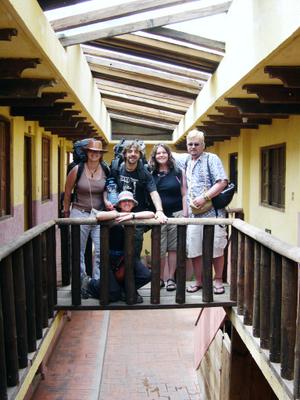
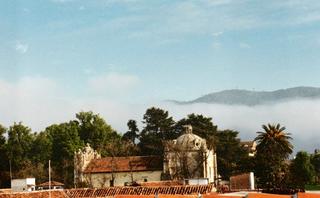
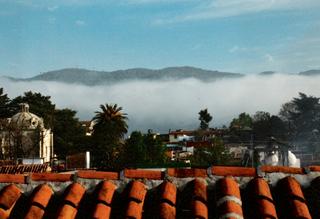
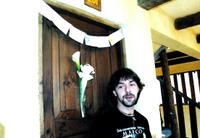

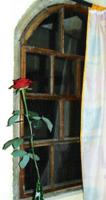

We clebrated my birthday in San Cristóbal. While Alan and I had morning coffee at the zócalo, Sonya, Kelly, and Julia went shopping at the market. They decorated our area of the hostal with fresh flowers and a banner that read, "Happy Birthday," and bought me some great gifts: a zapatista shirt, a great chunk of amber, a macrame' belt, change purse, and a cool piece of coconut shell with a carving of a lizard. It wasn't the gifts that made my birthday wonderful, it was the fellowship. We drank licores de caña, and then went shopping at the mercado for supperstuff. We decided on vegetarian spaghetti, and bought all of the ingredients fresh. Alan got yelled at by a market vendor for picking up and smeeling a giant kiwi looking thing. Later, Julia bought one. The flesh inside tasted like mashed sweet potato. MMMM! yummy.
Later that night, Kelly and I decided to go experience the local nightlife. We walked down to the zócalo asking everyone we encountered, ¿a dode van los gays para bailar? I think we got our point across, because people just laughed at us. We walked in circles, each time ending back at zócalo. We finnaly asked simply, ¿a donde va para bailar? and were led on another goose chase that ended at the zócalo. Realizing we only had one pair of flip-flops between us, I wore the left, Kelly wore the right, and we hopped aroud until we found a night spot. Live Salsa! Smoke Machines. ¡¡¡quatros chellas más, por favor!!! Just about the time we started having fun, we started feeling guilty for leaving our partners in the room. We
tried to get back to the hostal, but got lost a couple of times...hailed a cab...had to bang on the hostal door...we were in trouble. Ah well, it
was my birthday. The next morning, we had coffe agian at the zócalo, but never again. The zócalo is where all the vendors try to sell you their stuff. They don{t understand 'eat in peace,' or the word,
NO.From San Cristóbal, we took a second class bus up over the mountain to Tuxtla Gutiérrez. Again, we took dramamine. Along the ride, we saw scenes that looked like this:
TO BE CONTINUED...............................


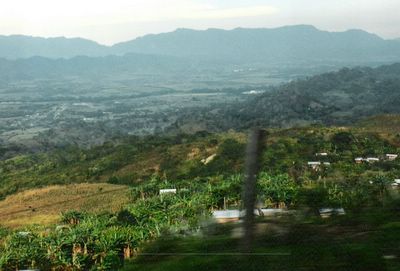
 Thank God we weren't on that bus! It didn't look like anyone was really hurt, though.
Thank God we weren't on that bus! It didn't look like anyone was really hurt, though. 